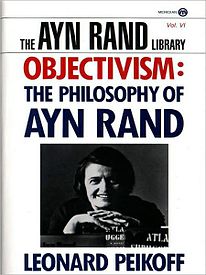- Objectivism: The Philosophy of Ayn Rand
-
Objectivism: The Philosophy of Ayn Rand 
Paperback edition coverAuthor(s) Leonard Peikoff Country United States Language English Series Ayn Rand Library Subject(s) Objectivism Publisher Dutton Publication date December 1991 Media type Print Pages 493 (first edition) ISBN ISBN 0-525-93380-8 (hardcover)
ISBN 0-452-01101-9 (paperback)OCLC Number 23647748 LC Classification B945.R234 P44 Objectivism: The Philosophy of Ayn Rand is a 1991 book by philosopher Leonard Peikoff about the ideas of his mentor, Ayn Rand. Peikoff describes it as "the first comprehensive statement" of Rand's Objectivist philosophy.[1] The book is based on a series of lecture courses that Peikoff first gave in 1976 and that Rand publicly endorsed. Peikoff states that only Rand was qualified to write the definitive statement of her philosophic system, and that the book should be seen as an interpretation "by her best student and chosen heir."[2] The book is volume six of the "Ayn Rand Library" series edited by Peikoff.
Contents
Content
The book is divided into 12 chapters. The first five chapters cover Rand's views on metaphysics and epistemology, which she considered the fundamental branches of philosophy. The remaining chapters cover Rand's views on ethics, politics and esthetics, which she considered to be derived from those fundamentals.[3] An epilogue titled "The Duel between Plato and Aristotle" discusses Objectivism's philosophy of history.
Reception
Objectivism: The Philosophy of Ayn Rand was praised by many of Peikoff's fellow Objectivist thinkers as a comprehensive presentation of Rand's philosophy. In a review for the Objectivist magazine The Intellectual Activist, Harry Binswanger said the book provided the first "full, systematic, non-fiction expression" of Objectivism, and said it was filled with "many electrifying ideas, elegant formulations, and majestic overviews."[4] In a treatise defending Rand's ethics, philosopher Tara Smith took Peikoff's book as "an authoritative source of [Rand's] views".[5] Edward W. Younkins said Rand's ideas were "authoritatively described and systematically explained" by Peikoff.[6] According to non-Objectivist Rand scholar Mimi Reisel Gladstein, "The reader who wants a comprehensive view of orthodox Objectivism as it has evolved since Rand's death should start with Peikoff's book."[7]
Peikoff's "orthodox" approach to Rand's ideas drew criticism. Rand scholar Chris Matthew Sciabarra described Peikoff's approach as "noncritical".[8] Non-orthodox Objectivist philosopher David Kelley wrote that Peikoff's introduction of the book as both a "definitive statement" and "interpreted" was "a tortured effort" based on fallacies.[9] In a review for Library Journal, philosopher Leslie Armour called Peikoff an "authorized evangelist" and "official expositor" who was too "bound to the received word" to write a good defense of Rand's ideas.[10]
Other critics attacked the content of Peikoff's views, not just the orthodoxy of his interpretation of Rand. Libertarian writer David Ramsay Steele described Peikoff's effort as "slapdash" and filled with positions that were "wrong, vacuous or trite".[11] Philosopher Henry B. Veatch wrote that Peikoff should have "paid a more discerning and discriminating attention to present-day academic philosophy," instead of "simply brushing academic ethics aside".[12]
References
- ^ Peikoff, Leonard (1991). Objectivism: The Philosophy of Ayn Rand. New York: Dutton. p. xiii. ISBN 0-525-93380-8.
- ^ Peikoff, Leonard (1991). Objectivism: The Philosophy of Ayn Rand. New York: Dutton. pp. xiv–xv. ISBN 0-525-93380-8.
- ^ Smith, Tara (2005). "Peikoff, Sylvan Leonard (1933- )". In Shook, John R.. The Dictionary of Modern American Philosophers. 4. London: Thoemmes Continuum. p. 1889. ISBN 1-84371-037-4. OCLC 53388453.
- ^ Binswanger, Harry (November 1991). "Book Review: Objectivism: The Philosophy of Ayn Rand". The Intellectual Activist 5 (7): 4–5.
- ^ Smith, Tara (2006). Ayn Rand's Normative Ethics: The Virtuous Egoist. New York: Cambridge University Press. p. 6. ISBN 0-521-86050-4. OCLC 60971741.
- ^ Younkins, Edward W. (2007). Champions of a Free Society: Ideas of Capitalism's Philosophers and Economists. Lanham, Maryland: Lexington Books. p. 201. ISBN 0-7391-2647-4. OCLC 228676591.
- ^ Gladstein, Mimi Reisel (1999). The New Ayn Rand Companion. Westport, Connecticut: Greenwood Press. p. 105. ISBN 0-313-30321-5. OCLC 40359365.
- ^ Sciabarra, Chris Matthew (1995). Ayn Rand: The Russian Radical. University Park, Pennsylvania: Pennsylvania State University Press. p. 2. ISBN 0-271-01440-7. OCLC 31133644.
- ^ Kelley, David (2000). The Contested Legacy of Ayn Rand: Truth and Toleration in Objectivism. New Brunswick, New Jersey: Transaction Publishers. p. 108. ISBN 0-7658-0863-3. OCLC 44727861.
- ^ Armour, Leslie (1991). "Objectivism: The Philosophy of Ayn Rand (review)". Library Journal 116.
- ^ Steele, David Ramsay (January 1992). "Peikoff's Objectivism: An Autopsy". Liberty 5 (3): 68.
- ^ Veatch, Henry B. (January 1992). "Might 'Objectivism' Ever Become Academically Respectable?". Liberty 5 (3): 62, 65.
External links
Ayn Rand Bibliography NovelsNon-fiction booksFor the New Intellectual (1961) · Introduction to Objectivist Epistemology (1979) · The Art of Fiction (2000)ScreenplaysEssay collectionsThe Virtue of Selfishness (1964) · Capitalism: The Unknown Ideal (1966) · The Romantic Manifesto (1969) · The New Left: The Anti-Industrial Revolution (1971) · Philosophy: Who Needs It (1982) · The Voice of Reason (1989)OtherNight of January 16th (1934) · The Early Ayn Rand (1984) · Letters of Ayn Rand (1995) · Journals of Ayn Rand (1997) · Objectivist periodicalsPhilosophy Biographical depictions Ayn Rand and the World She Made · Ayn Rand: A Sense of Life · Ayn Rand: The Russian Radical · Goddess of the Market · Judgment Day · The Passion of Ayn Rand (book) · The Passion of Ayn Rand (film)Notable adaptations Wikipedia Book · Wikimedia Commons · Wikiquote · Wikisource Categories:- Philosophy books
- Books about atheism
- Objectivist publications
Wikimedia Foundation. 2010.
